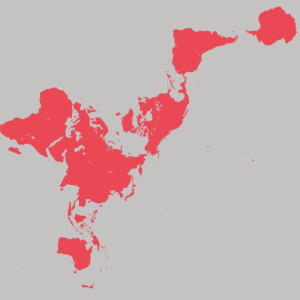Online discussion
SOUTH SOUTH Think Tank: Institutional Hybridity
–
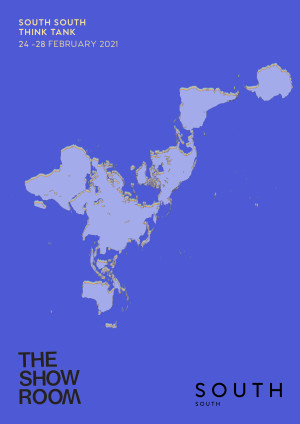
What does it mean to nurture a particular arts ecology? What does it take, from the inception of an idea – and its resolution in terms of a form or an experience – to its encounter with audiences and critics? What is at stake for artists, the artistic community, and members of the audience, both neophytes and aficionados alike?
In recent years, institutions have attempted to comply with neoliberal financial models of sustainability through strategies more creative than ever: distributing untested ideas and discourses; implementing numerous educational programmes claiming radical pedagogies and researches; testing idiosyncrasies through unexplored collaborative endeavours; decolonising structures and programming; supporting the production of small or large-scale commissions of emergent artists; and stimulating the proliferation of other roles, tasks, and methodologies within the labouring structure in the arts to avoid exhaustion or failure.
Such degree of inventiveness has at its core the need to address context more specifically, whilst offering a degree of relevance ensuring agency for international circulation and interest-holding. How do economic imperative, artistic production and distribution, and an ethical, cultural engagement all intertwine?
This first edition of the SOUTH SOUTH Think Tank explored strategies and methodologies that various cultural agents around the globe – particularly in its South, or counter- cultural platforms in its North – are considering to strike a balance that is sustainable to their local environments, as well of interest globally. Participants brought expertise through the transdisciplinary aspects of their practices that transcend any specific frameworks.
The purpose of this Think Tank was not necessarily to produce alternative focuses or centres to current dominants in the art world as seen from the South. Instead, it sought to offer a look through the myriad of connections and rhizomatic possibilities conceded to such Southerness, as a conceptual paradigm and as the catalyst for a critical and honest engagement to some of the most pressing questions in the field
Think Tank: Institutional Hybridity
About SOUTH SOUTH
SOUTH SOUTH is an online community, an archive, an anthology and a resource for artists, galleries, curators and collectors invested in the Global South. The platform’s launch brings together over 50 galleries from across five continents to present a more holistic world-view of contemporary art. The platform will create a repository and a space for new, shared value systems centred on community, collaboration and exchange. SOUTH SOUTH will offer a central portal to experience the programmes and artist profiles of galleries within and dedicated to the Global South. It will host year-round events and seeks, during these tumultuous times, to address an imbalance in the art world framework by providing a means to explore alternative art centres within a broader geopolitical context. SOUTH SOUTH will create space to magnify urgent conversations globally, foregrounded in these past turbulent months – including; the persisting need for decolonisation, restitution and connected sociopolitical concerns emerging out of recent manifestations of the racial justice movement. This discourse has been compellingly tackled by artists from the Global South for decades.
Platform: SOUTH SOUTH
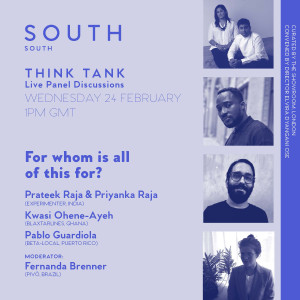
Prateek Raja & Priyanka Raja (Experimenter, India); Kwasi Ohene-Ayeh (blaxTARLINES, Ghana); Pablo Guardiola (Beta-Local, Puerto Rico); Moderator: Fernanda Brenner (Pivó, Brazil)
Participating organisations in this panel hold themselves to work in non-hierarchical structures, when it comes to addressing their audiences. This session will seek to address, among other issues: Who is the ‘WE’ each project invokes? How do we build structures around specific contexts, audiences, their desires and goals? How do we galvanise art and non-art audiences to engage in a set of ideas or commitments?
Moreover, if the ultimate goal is to support a democratic artistic experience, how does participation work and thrive? What roles do authorship and agency play in space-making and activating subjectivities?
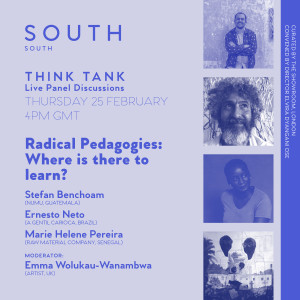
Stefan Benchoam (NuMu, Guatemala); Ernesto Neto (A Gentil Carioca, Brazil); Marie Hélène Pereira (RAW Material Company, Senegal); Moderator: Emma Wolukau-Wanambwa (Artist, UK)
Approaches of radical pedagogy have enduringly been linked to processes of unlearning, co-operation and critical thinking, often setting up frameworks in which the receiver is not a passive recipient, but rather an active contributor. Transdisciplinary experimentation, collaborative practices and processes of reparation are all key to comprehending decolonial structures of learning.
This panel will address how to empower epistemologies that have been —and times continue to be— in the margins? How do we overcome traditional, and at times, pyramidal forms of education?
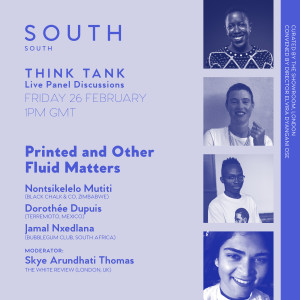
Nontsikelelo Mutiti (Black Chalk & Co, Zimbabwe); Dorothée Dupuis (Terremoto, Mexico);
Jamal Nxedlana (Bubblegum Club, South Africa); Moderator: Skye Arundhati Thomas (The White Review, UK)
In recent decades, all-encompassing platforms of knowledge and popular experience have expanded from the printed format to more fluid structures. Through dynamic and thought-provoking methods of documentation, we are increasingly communicating in spaces that bring together multidisciplinary features, build broader audiences and hold space for first-time public appearances. This session addresses the myriad of ways in which projects are creatively making space for multiple voices, ideas and layers in archival platforms.
By exploring these new strategies, this session will ask how do we continue expanding the limitations of materials – print, web, and beyond – to allow for nuanced discursive and digital possibilities?
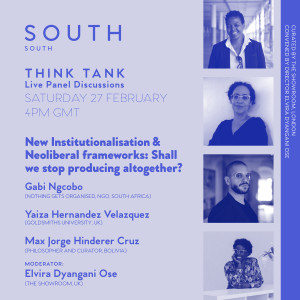
Gabi Ngcobo (Nothing Gets Organised, NGO, South Africa); Yaiza Hernández Velázquez (Visual Cultures, Goldsmiths, UK); Max Jorge Hinderer Cruz (Philosopher and Curator, Bolivia); Moderator: Elvira Dyangani Ose (The Showroom, UK)
Whilst acknowledging the rhetorical nature of the question ahead of us, one can’t help but wonder if it holds some truth. How should institutions produce in view of the unbearable feeling that simply going “back to normal” won’t do? Do institutions have to consider not only a Post-COVID reality to operate, but also an institutional model that is perhaps obsolete? What are the challenges we are facing?
Participants in this panel will help us to understand what critical aspects of “New Institutionalisation” means today and what are possible strategies, methodologies and, let’s admit, informal ploys, that institutions have at their disposal to go ahead with their programmes.
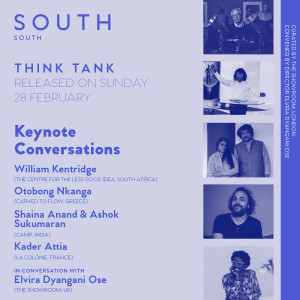
William Kentridge (The Centre for the Less Good Idea, South Africa); Otobong Nkanga (Carved to Flow, Greece); Shaina Anand & Ashok Sukumaran (CAMP, India); Kader Attia (La Colonie, France); In conversation with Elvira Dyangani Ose (The Showroom, UK)
This collection of in-depth keynote conversations will address some of the overarching questions of this Think Tank. How do institutions operate? In our mind, their institutions evolve as spaces which operate beyond the time and place of a particular artistic experience, bringing together all sorts of forms of knowledge and creative practices. All of them of an institutional nature, where hybridity can thrive. If that is certain, what is then a hybrid institution?
